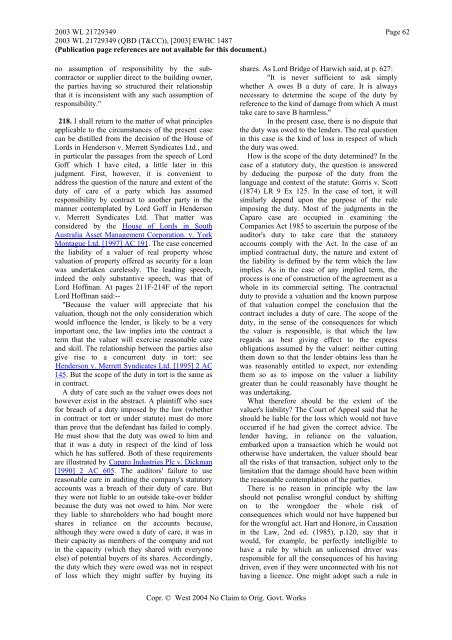Tesco v Constain - Thomson Reuters
Tesco v Constain - Thomson Reuters
Tesco v Constain - Thomson Reuters
You also want an ePaper? Increase the reach of your titles
YUMPU automatically turns print PDFs into web optimized ePapers that Google loves.
2003 WL 21729349 Page 622003 WL 21729349 (QBD (T&CC)), [2003] EWHC 1487(Publication page references are not available for this document.)no assumption of responsibility by the subcontractoror supplier direct to the building owner,the parties having so structured their relationshipthat it is inconsistent with any such assumption ofresponsibility."218. I shall return to the matter of what principlesapplicable to the circumstances of the present casecan be distilled from the decision of the House ofLords in Henderson v. Merrett Syndicates Ltd., andin particular the passages from the speech of LordGoff which I have cited, a little later in thisjudgment. First, however, it is convenient toaddress the question of the nature and extent of theduty of care of a party which has assumedresponsibility by contract to another party in themanner contemplated by Lord Goff in Hendersonv. Merrett Syndicates Ltd. That matter wasconsidered by the House of Lords in SouthAustralia Asset Management Corporation. v. YorkMontague Ltd. [1997] AC 191. The case concernedthe liability of a valuer of real property whosevaluation of property offered as security for a loanwas undertaken carelessly. The leading speech,indeed the only substantive speech, was that ofLord Hoffman. At pages 211F-214F of the reportLord Hoffman said:--"Because the valuer will appreciate that hisvaluation, though not the only consideration whichwould influence the lender, is likely to be a veryimportant one, the law implies into the contract aterm that the valuer will exercise reasonable careand skill. The relationship between the parties alsogive rise to a concurrent duty in tort: seeHenderson v. Merrett Syndicates Ltd. [1995] 2 AC145. But the scope of the duty in tort is the same asin contract.A duty of care such as the valuer owes does nothowever exist in the abstract. A plaintiff who suesfor breach of a duty imposed by the law (whetherin contract or tort or under statute) must do morethan prove that the defendant has failed to comply.He must show that the duty was owed to him andthat it was a duty in respect of the kind of losswhich he has suffered. Both of these requirementsare illustrated by HCaparo Industries Plc v. Dickman[1990] 2 AC 605. The auditors' failure to usereasonable care in auditing the company's statutoryaccounts was a breach of their duty of care. Butthey were not liable to an outside take-over bidderbecause the duty was not owed to him. Nor werethey liable to shareholders who had bought moreshares in reliance on the accounts because,although they were owed a duty of care, it was intheir capacity as members of the company and notin the capacity (which they shared with everyoneelse) of potential buyers of its shares. Accordingly,the duty which they were owed was not in respectof loss which they might suffer by buying itsshares. As Lord Bridge of Harwich said, at p. 627:"It is never sufficient to ask simplywhether A owes B a duty of care. It is alwaysnecessary to determine the scope of the duty byreference to the kind of damage from which A musttake care to save B harmless."In the present case, there is no dispute thatthe duty was owed to the lenders. The real questionin this case is the kind of loss in respect of whichthe duty was owed.How is the scope of the duty determined? In thecase of a statutory duty, the question is answeredby deducing the purpose of the duty from thelanguage and context of the statute: Gorris v. Scott(1874) LR 9 Ex 125. In the case of tort, it willsimilarly depend upon the purpose of the ruleimposing the duty. Most of the judgments in theCaparo case are occupied in examining theCompanies Act 1985 to ascertain the purpose of theauditor's duty to take care that the statutoryaccounts comply with the Act. In the case of animplied contractual duty, the nature and extent ofthe liability is defined by the term which the lawimplies. As in the case of any implied term, theprocess is one of construction of the agreement as awhole in its commercial setting. The contractualduty to provide a valuation and the known purposeof that valuation compel the conclusion that thecontract includes a duty of care. The scope of theduty, in the sense of the consequences for whichthe valuer is responsible, is that which the lawregards as best giving effect to the expressobligations assumed by the valuer: neither cuttingthem down so that the lender obtains less than hewas reasonably entitled to expect, nor extendingthem so as to impose on the valuer a liabilitygreater than he could reasonably have thought hewas undertaking.What therefore should be the extent of thevaluer's liability? The Court of Appeal said that heshould be liable for the loss which would not haveoccurred if he had given the correct advice. Thelender having, in reliance on the valuation,embarked upon a transaction which he would nototherwise have undertaken, the valuer should bearall the risks of that transaction, subject only to thelimitation that the damage should have been withinthe reasonable contemplation of the parties.There is no reason in principle why the lawshould not penalise wrongful conduct by shiftingon to the wrongdoer the whole risk ofconsequences which would not have happened butfor the wrongful act. Hart and Honore, in Causationin the Law, 2nd ed. (1985), p.120, say that itwould, for example, be perfectly intelligible tohave a rule by which an unlicensed driver wasresponsible for all the consequences of his havingdriven, even if they were unconnected with his nothaving a licence. One might adopt such a rule inCopr. © West 2004 No Claim to Orig. Govt. Works
















